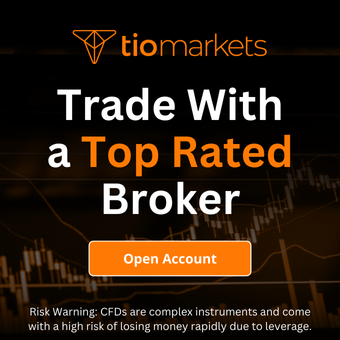Forex Trading Without a Broker | Is it a Good Idea?
BY Stefanos Mitsi
|August 12, 2025Forex (foreign exchange) trading is the process of buying one currency while simultaneously selling another, with the goal of profiting from changes in exchange rates. Traditionally, this is done through Forex brokers, who provide traders with access to trading platforms, leverage, and global liquidity.
Suppose you wanted to bypass the broker entirely; what would that look like? Some traders explore the possibility of Forex trading without a broker, seeking more control, reduced fees, or a different trading experience. However, it is widely accepted and generally better to do so with a forex broker.
Understanding how this works, the potential benefits, and the significant risks involved is essential before attempting it.
What Does “Forex Trading Without a Broker” Mean?
Forex trading without a broker simply means conducting currency exchange transactions directly, without going through a trusted online trading platform or brokerage firm.
Instead of using a broker’s trading platform, trades are executed via alternative methods such as:
- Peer-to-peer (P2P) trading with other individuals
- Direct transactions through banks
- Currency exchange offices
- Trust management arrangements
The key difference is that forex trading with a brokerage offers fast digital execution, leverage, and reputable protection, whereas non-broker methods are often manual, slower, and more reliant on personal negotiation.
Methods to Trade Forex Without a Broker
Peer-to-Peer (P2P) Forex Trading
Peer-to-peer Forex trading allows buyers and sellers to exchange currencies directly through online platforms (or in-person) that match users based on their offers and needs. Instead of going through a broker’s order book, you find a counterparty, agree on an exchange rate, and choose a payment method such as a direct bank transfer, online payment service, or even cash in person.
The main appeal of P2P trading is flexibility and potentially better rates, since you can negotiate terms directly and avoid broker spreads or commissions. However, you must carefully vet counterparties, as the lack of regulation increases counterparty risk. It’s also worth noting that P2P transactions may take much longer to execute and find the right match for your desired currency pair, and the amount can be less immediate than through a broker’s platform, such as TIOmarkets.
- Advantages: Lower fees, and flexible negotiation.
- Drawbacks: Counterparty risk (the other party might not complete the transaction) unless the platform uses escrow services.
Trading Through Banks
Some traders bypass brokers by using multiple bank accounts in different currencies to execute their own Forex transactions. For example, you might hold one account in USD and another in EUR, transferring funds between them when rates are favorable. If you convert USD to EUR when the euro is weaker, then later exchange back when the euro strengthens, you can potentially profit from the rate difference without going through a trading platform.
This method benefits from the security and regulation established by banks and can be useful for businesses or individuals dealing with large international payments. However, banks often apply wider spreads than brokers and may charge wire transfer or currency conversion fees, which can eat into profits. Transactions may also take longer to process, meaning you can’t respond instantly to sudden market movements.
- Advantages: Security and strict financial institutions.
- Drawbacks: Banks often have wider spreads and charge very high transfer fees, no access to other assets.
Bureau de Change / Currency Exchange Services
Similar to P2P trading, this is the most traditional form of currency trading, involving physical cash exchange or digital transfers through a currency exchange service or bureau de change. In Bureau de Change / Currency Exchange Services, you bring one currency and convert it into another at the posted rate, either in person at a physical location or via an online service linked to your bank account or card. The process is straightforward and, in the case of in-person transactions, usually instant, making it useful for travelers or those needing immediate access to foreign currency.
However, it is important to note that these services typically apply wider spreads than online brokers, meaning the buy and sell prices differ significantly, which reduces your overall potential profit. They also have volume limitations, making them impractical for large-scale Forex trading, and offer no advanced tools for market analysis, automated orders, or rate alerts that brokerages like TIOmarkets have. As a result, while convenient for quick exchanges, this method is less suited for active traders looking to capitalize on short-term currency fluctuations.
- Advantages: Instant exchange in person.
- Drawbacks: High spreads, limited volume capacity, and no advanced trading tools.
Trust Management
Another way to trade Forex without directly using a broker platform is through trust management, where you appoint a professional trader or fund manager to handle currency transactions on your behalf. In this arrangement, you provide the capital, and the manager uses their own networks, institutional accounts, or direct market access to execute trades. This can be structured through a formal agreement, often with performance-based fees, and may be attractive to those who want exposure to the Forex market without actively managing trades themselves.
While this approach can leverage the expertise of seasoned professionals, it comes with significant risks. You are placing complete trust in the manager’s skills, transparency, and integrity. Without a brokerage account, oversight may be limited, and there’s a higher risk of mismanagement or fraud. It’s essential to conduct thorough due diligence, verify the manager’s track record, and have clear contractual terms to protect your investment.
- Advantages: Someone else handles the technical work.
- Drawbacks: Lack of transparency, reliance on trust, and potential for mismanagement.
Drawbacks of Forex Trading Without a Broker
Although the idea of forex trading without a broker can sound attractive, the limitations quickly become clear when compared to the advantages of working with one. While you may be able to avoid broker fees, the trade-off often comes at the expense of speed, with manual transactions taking hours or even days to process compared to the near-instant execution brokers provide. The convenience of managing all trades, funds, and market analysis from a single secure platform is also lost, replaced instead by the need to coordinate with multiple parties or institutions.
Without a broker, trust and security can be much harder to guarantee. Regulated brokers must follow strict financial standards to protect their clients, including but not limited to segregating client funds and providing transparent dispute resolution processes. These safeguards are not always available when dealing directly with individuals or unregulated services. You may also lose access to the global liquidity that brokers tap into, meaning you’ll often face less competitive rates and wider spreads, especially in volatile market conditions.
For most traders, especially beginners, the benefits of using a reputable Forex broker far outweigh the potential cost savings of going it alone. Brokers provide advanced charting tools, real-time market data, one-click trade execution, and dedicated support teams to help you navigate the markets confidently. Most importantly, reputable and trusted brokers operate within a framework designed to protect your capital and ensure fair trading conditions, making traditional broker-facilitated trading both a more practical and a more secure choice for anyone serious about long-term success in Forex.
Here are the significant risks when forex trading without a broker:
- Counterparty risk: Higher chance of fraud or failed transactions.
- Limited leverage: No access to margin trading, which can limit risk, as well as profit potential.
- Lower liquidity: Larger trades may be harder to execute quickly.
- Longer transaction times: Transfers can take hours or days.
- Lack of protection: No regulatory safeguards if something goes wrong.
- Higher capital requirement: Without leverage, you need more funds to make meaningful trades.
- Limited access to markets: Without a broker, you cannot access the wide range of instruments typically offered, such as CFDs, indices, commodities, and a vast variety of currency pairs.
- No Trading Tools: You lose access to technical analysis tools, trading platforms (like MT4/MT5), and trading automation.
Why Trade Forex With a Broker
While it is possible to trade Forex without a broker, the advantages of using a reputable brokerage make it the smarter and safer choice for most traders. Forex brokers provide infrastructure, security, and resources that independent traders simply cannot match. Below are the key points why using a broker is the more practical and secure choice.
Lower Counterparty Risk
When you trade through a reputable broker, you eliminate the uncertainty of dealing directly with unknown individuals or unregulated services. Brokers operate under strict compliance rules, giving you a secure and trustworthy environment to execute trades.
Access to Leverage and Margin
Brokers give you the ability to trade on margin, allowing you to control larger positions with a smaller amount of capital. This can significantly increase your profit potential compared to the capital-heavy requirements of forex trading without a broker.
High Liquidity and Fast Execution
Brokers connect you to deep global liquidity pools, enabling faster execution and better pricing. Without a broker, larger trades can be harder to execute quickly, and you may face less competitive rates.
Instant Transactions
Through a broker’s trading platform, orders are executed in milliseconds. By contrast, manual exchanges or bank transfers can take hours or even days—costing you opportunities in fast-moving markets.
Regulatory Safeguards
A regulated broker offers client fund protection, transparent dispute resolution, and adherence to industry standards. These safeguards don’t exist when trading without a broker, leaving you more exposed to risk.
Lower Capital Requirements
The leverage offered by brokers allows you to start trading with a smaller deposit, while still gaining meaningful market exposure. Trading without leverage typically requires much higher capital to achieve similar results.
Access to a Wider Range of Markets
Brokers give you access not only to major and minor currency pairs but also to CFDs, indices, commodities, precious metals, and cryptocurrencies, broadening your trading opportunities.
Advanced Tools and Platforms
With a broker, you can use professional-grade platforms like MT4 or MT5, complete with technical analysis tools, charting software, economic calendars, and automated trading capabilities. Without these resources, market analysis becomes slower, less precise, and more manual.
Access Passive Income Services
One major advantage of trading with a broker is access to passive income opportunities such as PAMM (Percentage Allocation Management Module) accounts and copy trading. These services allow you to earn from the markets without actively placing trades yourself.
For example, with copy trading, you can automatically replicate the trades of experienced professionals in real time, while PAMM accounts enable you to invest funds with a skilled money manager who trades on your behalf and shares a percentage of the profits. Without a broker, these services are simply not available, meaning you must manage every trade yourself, monitor the markets constantly, and rely solely on your own skills and availability, making it much harder to generate consistent returns without a significant time commitment.
Who Should Consider Forex Trading With a Broker?
Forex trading through a broker is well-suited for a wide range of traders, from complete beginners to seasoned professionals, as it provides the tools, infrastructure, and protections needed to trade efficiently and securely.
New traders benefit from user-friendly trading platforms, demo accounts for practice, educational resources, and access to customer support that can guide them through the early stages of learning the markets. Forex brokers also allow beginners to start with smaller deposits and offer leverage options, enabling participation in the Forex market without needing a large amount of capital upfront.
Experienced traders also find value in using a broker because it grants access to global liquidity, advanced charting and analysis tools, and fast execution speeds necessary for strategies such as scalping or day trading. Businesses and high-volume traders benefit from the competitive pricing, tighter spreads, and reduced slippage that brokers can provide by connecting directly to major liquidity providers.
Perhaps most importantly, trading with a regulated broker offers a layer of trust and security. Client funds are safeguarded, transactions are transparent, and there are formal channels for dispute resolution. For anyone who values efficiency, security, and professional-grade tools. Working with a reputable Forex broker is the most practical and secure choice when it comes to trading foreign exchange.
Compare trading Forex Trading With vs. Without a Broker
| Aspect | With Broker | Without Broker |
| Transaction Costs | Higher (commissions, spreads) | Bigger exchange rates. |
| Access to Leverage | Available (Up to 1:500 with TIOmarkets). | Not available. |
| Execution Speed | Instant or near-instant. | Time-consuming, could take hours or longer. |
| Regulation & Security | Strong if the broker is regulated. | Limited, depends on counterparties. |
| Trading Tools | Advanced platforms, charts, and indicators. | Not available. |
| Passive Income Services | Earn without active trading (PAMM & copy trading). | Not widely available. Possible fees or profit-sharing |
| Legal Protection | Reputable brokers offer fund safety and comply with financial laws. | Limited in offshore or lightly regulated jurisdictions. |
| Support & Education | Access training materials, webinars, and market analysis with 24/7 customer support | No guidance given. |
Should You Trade Forex Without a Broker?
Yes, it’s possible to trade forex without a broker, but it’s not ideal and generally more expensive compared to trading forex with a broker. It is less convenient, execution is slower, and you don't get any leverage.
Forex brokers, like TIOmarkets, offer speed, leverage, and access to global liquidity that trading without a broker just can’t match. If you do explore this route, proceed with caution, ensure trust in your counterparties, and be prepared to manage every detail yourself.
If trading Forex with a reputable broker feels like the right choice for you, you can begin risk-free and open a trading account with TIOmarkets.

Risk disclaimer: CFDs are complex instruments and come with a high risk of losing money rapidly due to leverage. You should consider whether you understand how CFDs work and whether you can afford to take the high risk of losing your money. Never deposit more than you are prepared to lose. Professional client’s losses can exceed their deposit. Please see our risk warning policy and seek independent professional advice if you do not fully understand. This information is not directed or intended for distribution to or use by residents of certain countries/jurisdictions including, but not limited to, USA & Countries included in the OFAC sanction list. The Company holds the right to alter the aforementioned list of countries at its own discretion.
TIOmarkets offers an exclusively execution-only service. The views expressed are for information purposes only. None of the content provided constitutes any form of investment advice. The comments are made available purely for educational and marketing purposes and do NOT constitute advice or investment recommendation (and should not be considered as such) and do not in any way constitute an invitation to acquire any financial instrument or product. TIOmarkets and its affiliates and consultants are not liable for any damages that may be caused by individual comments or statements by TIOmarkets analysis and assumes no liability with respect to the completeness and correctness of the content presented. The investor is solely responsible for the risk of his/her investment decisions. The analyses and comments presented do not include any consideration of your personal investment objectives, financial circumstances, or needs. The content has not been prepared in accordance with any legal requirements for financial analysis and must, therefore, be viewed by the reader as marketing information. TIOmarkets prohibits duplication or publication without explicit approval.
Join us on social media

Stefanos is a seasoned financial markets executive with deep expertise in forex, CFDs, and global brokerage leadership. He has held senior leadership roles across multiple regulated financial services firms. He is also a passionate content creator and wants to share his knowledge to the world.





